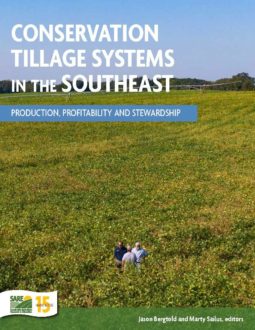A Farmer-Researcher Collaborative Effort to Design No-Till Systems Appropriate for Small-Scale Organic Producers in Alabama and the Deep South
Project Information
Project type: Research and Education Grant
Project number: LS09-218
Project dates: 2009–2013
Principal investigator:
Joseph Kloepper
Auburn University
Project reports: https://projects.sare.org/sare_project/ls09-218/
Problem Statement
No-till has been implemented successfully on large-scale conventional farms that rely on herbicides, chemical fertilizers and no-till seeders and transplanters in production. Adoption of no-till on small-scale organic farms, however, presents several challenges. Without the use of herbicides, cover crops must be terminated by crimping or mowing at the exact time at which they are the most vulnerable. Without the use of fast-release chemical fertilizers, nitrogen and nutrients must be applied through either a cover crop mix that includes legumes or through large amounts of compost. The lack of herbicides and tillage also means that farmers rely heavily on cover crop residue to prevent the growth of weeds during the cash crop growing season.
Five farmers from Alabama and researchers at Auburn University and the USDA Agricultural Research Service (ARS) partnered in a study investigating the implementation of no-till methods in small-scale organic vegetable production over a four-year period (2009–2012).
Methods and Practices
For the study, a variety of cover crop monocultures and mixes were evaluated in trials at Auburn research stations and by farmers at the farm level. The farmers adopted no-till, choosing the cash crops and cover crops they would grow in consultation with researchers who provided equipment and field demonstrations of no-till techniques. Farmers were responsible for maintaining no-till methods for the length of the study, with researchers visiting periodically during the growing season to evaluate the effectiveness and profitability of no-till in small-scale vegetable production. Cash crops included tomatoes, squash, okra and corn. Site-specific and cropping-system-specific tillage treatment evaluations were conducted annually. Participants were provided with no-till equipment (seed drills, rollers, crimpers and transplanters) by the Alabama Sustainable Agriculture Network and shown how to use the equipment during educational field days. USDA-ARS researchers advised participants on optimal weed management techniques.
Results
Four of the five participating farmers produced a healthy cover crop and were able to use the residue for the planting of cash crops. Farmers’ cash crops were less successful. One of the findings of this study was that no-till vegetable production is difficult in the South due to the high rate of cover crop residue decomposition and the amount of space left between crop rows. This allowed for increased weed invasion but also interfered with weed management strategies, such as mowing. No-till was also shown to be poorly suited to the traditional method of vegetable row-crop production, with aisles left between crop rows. While fall crops were not heavily impacted, summer crops faced intense competition with weeds. Though the on-farm trials indicate that no-till is an unviable method for organic vegetable farming, crop studies continue at research stations across Alabama, with the potential for more insight into the better implementation of no-till.
[end of case study]
